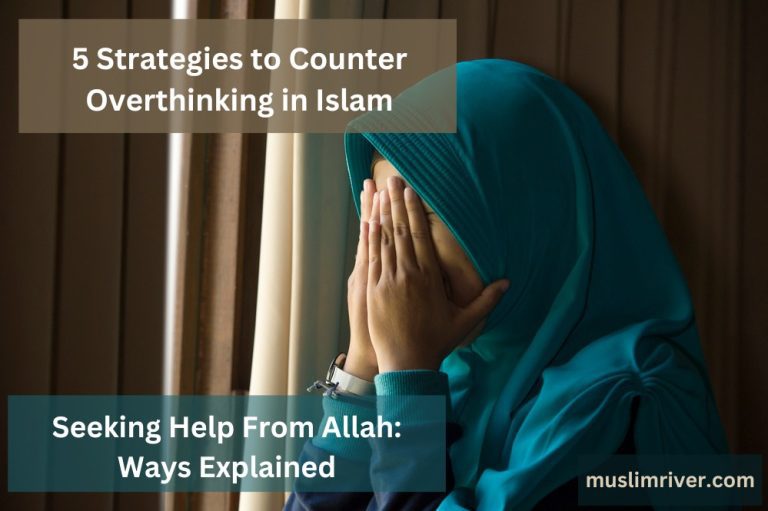Dhikr of the Heart: The Silent Remembrance and Its Religious Depth
Introduction
Dhikr of the Heart—a quiet, internal remembrance without spoken words—might seem subtle, but its roots run deep in the Qur’an.
Arabic: وَٱذْكُر رَّبَّكَ فِى نَفْسِكَ تَضَرُّعًۭا وَخِيفَةًۭ وَدُونَ ٱلْجَهْرِ مِنَ ٱلْقَوْلِ بِٱلْغُدُوِّ وَٱلْـَٔاصَالِ وَلَا تَكُن مِّنَ ٱلْغَـٰفِلِينَ
Translation: Remember your Lord in your heart with humility and awe, and without speaking loudly, in mornings and evenings, and do not be among the heedless.
Source: Surah Al-A’raf – 205 – Quran.com
This verse affirms the depth of inward remembrance. It emphasizes humility, awe, and presence over volume.
Dhikr isn’t limited to spoken words; it’s also about a heart that is awake, aware, and connected to its Creator.
Dhikr of the Heart invites you into that inner stillness. It’s the remembrance that echoes within—when lips are still, but the soul is alive. Whether you’re walking, waiting, or working, your heart can stay tuned to Allah’s presence. And that quiet rhythm can be your most profound form of worship.
This blog post synthesizes insights from scholarly articles and religious texts, structured to enhance readability and engagement through clear formatting and supportive Content with references.
Exploring into the Silent Power of Dhikr, this blog post addresses “What is Dhikr of the Heart“, Goals, Steps and Benefits.
This blog post aims to deepen spiritual connection and emotional stability, fostering peace and resilience through daily Dhikr practices.
Stay tuned as we reveal a simple yet profound visual Dhikr guide, designed to seamlessly integrate this spiritual practice into your daily life, transforming routine moments into profound connections with the divine.

What is Islamic Dhikr of the Heart?
Have you ever wondered how a silent, heartfelt remembrance could transform your daily life and spiritual journey?
I’ll walk you through how each attribute of Dhikr of the Heart from its silent nature to its transformative impact plays a crucial role in not just personal but spiritual development, helping you to live a life aligned with spiritual mindfulness.
Here are its key attributes elaborated:
1. Silent: Practiced internally without vocalization, this form of Dhikr allows the heart to engage in remembrance without drawing external attention, preserving the purity of intent.
2. Conscious: It requires an acute level of awareness and concentration, ensuring that the heart is fully present in each moment of remembrance, thus deepening the spiritual connection.
3. Continuous: This form of Dhikr can be practiced at all times—during work, leisure, and social interactions—making it a continuous thread throughout the practitioner’s daily life.
4. Intimate: By bypassing vocal expression, it cultivates a personal and confidential dialogue between the individual and Allah, strengthening the spiritual bond.
5. Emotional: It taps into deep-seated feelings of love, awe, reverence, and fear of Allah, enriching the practitioner’s emotional landscape and spiritual resilience.
6. Transformational: Regular engagement in this practice refines the soul, encourages ethical conduct, and fosters a profound sense of taqwa (God-consciousness).
7. Higher State: Recognized as a more spiritually potent form of Dhikr, it challenges the practitioner to elevate their spiritual discipline beyond routine verbal recitations.
8. Reflective: This practice is intertwined with muraqabah (vigilance over one’s heart), tafakkur (deep contemplation), and tawakkul (complete reliance on Allah), enhancing one’s spiritual mindfulness and reliance.
9. Non-visible: The inconspicuous nature of this Dhikr guards against spiritual ostentation and promotes sincerity, focusing solely on divine approval.
10. Guides Actions: By embedding the consciousness of Allah in every aspect of life, it influences personal actions and decisions in accordance with Islamic principles.
Understanding Dhikr of the Heart is not just about knowing a spiritual practice; it’s about realizing the profound impact it can have on your daily life and spiritual well-being.
By engaging deeply and silently with your faith, you not only enhance your personal connection with Allah but also foster a tranquil mind and heart that resonate throughout your daily activities.
Focus and Goals of Islamic Dhikr of the Heart
Imagine reaching the end of a hectic day and finding solace in a practice that requires nothing but a silent, mindful pause.
I’ll outline the key goals of Dhikr, explaining how each aligns with its spiritual purposes, and show you how to integrate these into your daily routine for a more focused and fulfilling spiritual practice.
Embracing Dhikr of the Heart is not just a practice but a transformative journey that redefines our connection with Allah.
Here’s how it focuses our spiritual lens and sets forth its profound goals:
1. Purpose of Dhikr: The essence of Dhikr lies in cultivating a continuous and intimate remembrance of Allah.
It’s about keeping our Creator at the forefront of our thoughts, regardless of our daily activities, thus embedding spirituality into the fabric of our everyday lives.
2. Spiritual Focus: Dhikr centers our heart and mind on Allah, allowing us to transcend the mundane distractions that often lead us astray.
This focus is not just about avoiding distraction but about elevating our consciousness to maintain a divine connection throughout the day.
3. Goals of Dhikr: There are few goals of Dhikr that are quite beneficial and include following:
- Spiritual Purification: Regular Dhikr cleanses the heart, helping to purge negative thoughts and feelings that tarnish our spiritual well-being.
It’s like a refresh button for the soul, clearing away the impurities that cloud our judgment and actions. - Increased Taqwa: Dhikr enhances our God-consciousness, guiding our actions towards righteousness.
This heightened awareness makes every decision, every action more aligned with Islamic principles, helping us to live a life that is pleasing to Allah. - Emotional Stability: In our moments of stress and anxiety, Dhikr serves as a stabilizing force, offering comfort and reassurance.
It reminds us that Allah is always with us, providing a soothing balm for our restless hearts. - Achieving Inner Peace: Through regular engagement with Dhikr, we cultivate a state of tranquility and contentment.
This inner peace is a sanctuary, shielding us from the chaos of the external world and aligning us more closely with our spiritual goals. - Connection with the Divine: Dhikr strengthens our personal bond with Allah, making our spiritual practice deeply personal and immensely fulfilling.
It transforms our relationship with the Creator into a dialogue, a continuous exchange that nourishes our spiritual life.
Abu Huraira reported Allah’s Messenger (ﷺ) as saying that Allah, the Exalted and Glorious, thus stated:
Arabic: يَقُولُ اللَّهُ عَزَّ وَجَلَّ أَنَا عِنْدَ ظَنِّ عَبْدِي بِي وَأَنَا مَعَهُ حِينَ يَذْكُرُنِي إِنْ ذَكَرَنِي فِي نَفْسِهِ ذَكَرْتُهُ فِي نَفْسِي وَإِنْ ذَكَرَنِي فِي مَلإٍ ذَكَرْتُهُ فِي مَلإٍ هُمْ خَيْرٌ مِنْهُمْ وَإِنْ تَقَرَّبَ مِنِّي شِبْرًا تَقَرَّبْتُ إِلَيْهِ ذِرَاعًا وَإِنْ تَقَرَّبَ إِلَىَّ ذِرَاعًا تَقَرَّبْتُ مِنْهُ بَاعًا وَإِنْ أَتَانِي يَمْشِي أَتَيْتُهُ هَرْوَلَةً ”
Translation: I am near to the thought of My servant as he thinks about Me, and I am with him as he remembers Me. And if he remembers Me in his heart, I also remember him in My Heart, and if he remembers Me in assembly I remember him in assembly, better than his (remembrance), and if he draws near Me by the span of a palm, I draw near him by the cubit, and if he draws near Me by the cubit I draw near him by the space (covered by) two hands. And if he walks towards Me, I rush towards him.
This Hadith exemplifies the profound spiritual dynamics of Dhikr, where Allah’s closeness to the believer is directly proportional to their remembrance of Him, thereby highlighting the immense value and deep personal connection fostered through consistent spiritual mindfulness.
Grasping the purpose, focus, and goals of Dhikr of the Heart equips you with a powerful framework for spiritual enhancement.
This understanding doesn’t just enrich your knowledge; it fundamentally transforms how you approach spirituality in everyday life.
By consciously aligning your Dhikr practices with specific spiritual goals, you pave the way for a life that is not only led by faith but also anchored in profound personal contentment and spiritual resilience.
Practical Steps to Cultivate Dhikr of the Heart
Many underestimate the profound impact that focused spiritual practice can have on personal well-being and resilience.
I’ll help you understand the importance of setting the right environment for Dhikr, walk you through easy-to-start practices, and demonstrate how to make Dhikr a natural part of your everyday activities, thus ensuring a continuous and beneficial spiritual presence.
Embarking on the journey of Dhikr of the Heart can be both inspiring and profound.
Arabic: يَا أَيُّهَا الَّذِينَ آمَنُوا اذْكُرُوا اللَّهَ ذِكْرًا كَثِيرًا وَسَبِّحُوهُ بُكْرَةً وَأَصِيلاً
Translation: O believers! Always remember Allah often and glorify Him morning and evening.
This verse emphasizes the importance of constant remembrance of Allah throughout the day, encouraging believers to integrate Dhikr into their daily routines, which resonates with the steps you outlined.
Here are practical steps to help you cultivate this deeply spiritual practice in your daily life:
1. Step 1: Preparing the Mind and Environment- Find a quiet and comfortable space where you can be undisturbed. This might be a small corner of your room or a peaceful spot outdoors.
The key is to have a place that helps you feel relaxed and spiritually receptive.
Before beginning Dhikr, take a moment to clear your mind of daily stresses.
Focus on your intention – why you are engaging in this practice and what you hope to achieve.
This preparation helps deepen your engagement and makes the Dhikr more impactful.
2. Step 2: Simple Dhikr Phrases for Beginners- Start with simple phrases like “SubhanAllah” (glory be to Allah) and “Alhamdulillah” (all praise be to Allah).
These can be easily integrated into your daily routine.
While reciting these phrases, keep your focus on their meanings and the presence of Allah.
This mindfulness enhances the spiritual connection and prevents the practice from becoming mechanical.
Arabic: إِنَّ أَفْضَلَ الدُّعَاءِ (الْحَمْدُ لِلَّهِ)، وَأَفْضَلَ الذِّكْرِ (لاَ إِلَهَ إِلاَّ اللَّهُ)
Translation: Alḥamdulillāh and the most excellent words of remembrance are: Lā ilāha illallāh. The most excellent invocation is: Praise is for Allah. And the most excellent words of remembrance are: There is none worthy of worship but Allah.
3. Step 3: Incorporating Dhikr into Daily Life- As you grow more comfortable with Dhikr, try to expand its presence in your daily activities.
Recite Dhikr while doing chores, driving, or even during work breaks.
The goal is to make Dhikr a constant backdrop to your life, helping you maintain a continuous spiritual connection.
Grasping these practical steps—preparing your mind and environment, learning beginner Dhikr practices, and incorporating them into your daily life—has profound implications for your spiritual and emotional health.
It ensures that your journey towards spiritual mindfulness is not only intentional but also integrated into every aspect of your life, enhancing your overall well-being and resilience.
Unique Benefits of Dhikr of the Heart
Ever wondered how small, daily spiritual practices can profoundly affect your life?
Let me walk you through how daily Dhikr can offer immediate emotional relief and long-term spiritual growth, helping you cultivate a deeper sense of peace and purpose in your everyday life.
Dhikr of the Heart is not just a practice but a transformative experience that enriches our lives in many unique ways.
Here are some of the immediate and spiritual benefits that it brings:
1. Immediate Felt Experience: Some of the benefits that you feel immediately are following.
- Inner Stillness: Amidst the chaos of everyday life, Dhikr helps cultivate a sense of inner peace and calm, allowing you to remain centered in stressful situations.
- Subtle Joy/Contentment: Engaging in Dhikr often brings about a subtle joy and contentment, fostering a positive outlook and satisfaction with life.
- Closeness to Allah: This practice enhances your feeling of closeness to Allah, making your spiritual journey more personal and profound.
- Emotional Resilience: Regular Dhikr strengthens emotional resilience, equipping you to handle life’s ups and downs with greater ease.
- Ongoing Spiritual Awareness: It keeps you spiritually alert, continuously reminding you of Allah’s presence and your spiritual duties.
2. Long-term Spiritual Benefits: Some spiritual benefits of Dhikr include the following.
- Taqwa (God-consciousness): Dhikr deepens your awareness of Allah in every aspect of life, encouraging you to live in a way that is pleasing to Him.
- Ikhlas (Sincerity): It fosters sincerity in worship and in everyday actions, aligning them with divine will.
- Behavioral Change: The constant remembrance of Allah through Dhikr encourages positive behavioral changes, promoting good deeds and discouraging sin.
- Clarity in Decision-Making: With a spiritually attuned mind, making decisions that reflect Islamic values becomes more straightforward.
- Spiritual Elevation: Dhikr elevates your spiritual state, helping you ascend to higher levels of faith and closeness to Allah.
Arabic: وَعَنْ أَبِي الدَّرْدَاءِ رَضِيَ اللَّهُ عَنْهُ قَالَ: قَالَ رَسُولُ اللَّهِ صَلَّى اللَّهُ عَلَيْهِ وَسَلَّمَ: «أَلَا أُنَبِّئُكُمْ بِخَيْرِ أَعْمَالِكُمْ وَأَزْكَاهَا عِنْدَ مَلِيكِكُمْ؟ وَأَرْفَعِهَا فِي دَرَجَاتِكُمْ؟ وَخَيْرٍ لَكُمْ مِنْ إِنْفَاقِ الذهبِ والوَرِقِ؟ وخيرٍ لكم مِنْ أَنْ تَلْقَوْا عَدُوَّكُمْ فَتَضْرِبُوا أَعْنَاقَهُمْ وَيَضْرِبُوا أَعْنَاقَكُمْ؟» قَالُوا: بَلَى قَالَ: «ذِكْرُ اللَّهِ» . رَوَاهُ مَالِكٌ وَأَحْمَدُ وَالتِّرْمِذِيُّ وَابْنُ مَاجَهْ إِلَّا أَنَّ مَالِكًا وَقفه على أبي الدَّرْدَاء
Translation: Abud Darda’ reported God’s messenger as saying, “Would you like me to tell you the best and purest of your deeds in the estimation of your King, those which raise your degrees highest, those which are better for you than spending gold and silver, and are better for you than that you should meet your enemy and cut off one another’s head?” On receiving a reply in the affirmative he said, “It is remembering God.”
Source: Mishkat al-Masabih 2269 – Supplications – كتاب الدعوات – Sunnah.com – Sayings and Teachings of Prophet Muhammad (صلى الله عليه و سلم)
This Hadith highlights that Dhikr is not only the most excellent of deeds but also provides the believer with spiritual elevation, surpassing even the virtues of charity and bravery in battle.
The practice of Dhikr isn’t just about routine; it’s about opening your heart to a continuous flow of spiritual nourishment and emotional resilience.
Dhikr of the Heart — What to Be Aware Of
When embarking on the enriching journey of Dhikr of the Heart, it’s essential to approach it with awareness and understanding.
I’ll show you how to maintain consistency in Dhikr, deepen your practice beyond routine, and navigate distractions and spiritual stagnation. You’ll learn to identify genuine guidance, transforming your spiritual routine into a deeply fulfilling part of your life, enhancing your peace and connection.
Here are some friendly tips to keep in mind:
1. Consistency and Discipline: Just like any meaningful practice, Dhikr requires consistency.
Make it a part of your daily routine, setting aside specific times for Dhikr to ensure it becomes a habit.
It’s like watering a plant; regular care makes it thrive.
If you find yourself struggling to maintain consistency, try linking your Dhikr practice to daily activities like after prayer times or before bed.
2. Depth vs. Routine: While it’s great to integrate Dhikr into your daily routine, be mindful not to let it become just another box to tick.
Engage with each phrase deeply, understand its meanings, and let it resonate with your heart.
This depth will transform your practice from a routine to a profound spiritual connection.
3. Overcoming Distractions: We live in a world brimming with distractions. When you sit down for Dhikr, try to minimize disruptions.
Turn off unnecessary electronic devices, find a quiet spot, and allow your mind to focus solely on your spiritual practice.
This focus will deepen your connection and enhance the benefits of Dhikr.
4. Spiritual Plateaus: Like any spiritual journey, you might encounter periods where your progress feels stagnant.
During these times, it’s crucial to stay motivated and patient.
Remember, every effort counts in your spiritual growth, even when it doesn’t feel like it.
Sometimes, the act of persisting through these plateaus can be a profound growth experience in itself.
5. Authentic Sources and Guidance: Dhikr is a beautiful practice, but it’s important to ensure you’re learning it correctly.
Seek knowledge from authentic sources—scholars who are respected and knowledgeable in Islamic teachings.
If possible, find a mentor or a spiritual guide who can help you refine your practice and answer your spiritual questions.
Arabic: ٱلَّذِينَ ءَامَنُوا۟ وَتَطْمَئِنُّ قُلُوبُهُم بِذِكْرِ ٱللَّهِ ۗ أَلَا بِذِكْرِ ٱللَّهِ تَطْمَئِنُّ ٱلْقُلُوبُ
Translation: Those who believe and whose hearts find comfort in the remembrance of Allah. Surely in the remembrance of Allah do hearts find comfort.
Source: Surah Ar-Ra’d – 1-43 – Quran.com
This verse directly speaks to the profound impact of Dhikr on a believer’s heart, offering reassurance and tranquility, and is particularly relevant to deepening one’s spiritual practice beyond mere routine.
Mastering the subtleties of Dhikr, such as maintaining consistency, understanding the depth of practice, and recognizing authentic spiritual guidance, not only enriches your daily Dhikr but also ensures it truly transforms your spiritual life.
This deeper engagement brings you closer to achieving profound inner peace and a more resonant spiritual connection.
Accessibility and Adaptation of Dhikr
Have you ever wondered how Dhikr can be adapted to fit into every lifestyle, no matter how busy or varied?
I’ll break down the steps to ensure Dhikr fits into any schedule, introduce beginner-friendly practices, and explore how different environments can impact your spiritual routine, helping you build a resilient and adaptable spiritual practice.
Dhikr, the beautiful practice of remembering Allah, is wonderfully accessible and can be adapted to suit everyone, regardless of their spiritual maturity or lifestyle.
Here’s how you can make Dhikr a part of your life, no matter where you are on your spiritual journey:
1. Universal Accessibility: One of the most beautiful aspects of Dhikr is its simplicity and universal accessibility.
Whether you are a seasoned practitioner or just starting out, Dhikr doesn’t require extensive knowledge or a specific place.
It’s a practice that welcomes all, adaptable to various levels of understanding and spiritual states.
You can start with simple phrases like “Allahu Akbar” (Allah is the Greatest) and feel the tranquility it brings into your life.
2. Guidance for Beginners: If you’re new to this practice, begin with basic phrases that are easy to remember and repeat.
“SubhanAllah” (Glory be to Allah) and “Alhamdulillah” (All praise is due to Allah) can be seamlessly integrated into your daily activities.
Start by associating Dhikr with routine actions like commuting or washing dishes.
The key is to start small and gradually increase your practice as it becomes a natural part of your daily rhythm.
3. Environmental Considerations: While Dhikr can be done anywhere, creating an environment that enhances your focus can be very helpful.
If possible, dedicate a quiet corner of your home for spiritual practices. A clean and organized space minimizes distractions and helps in maintaining focus during Dhikr.
If you’re often on the move, consider using moments of stillness like waiting in line or sitting in a park to engage in Dhikr, turning these pauses into opportunities for spiritual growth.
Embracing the universal accessibility of Dhikr, coupled with guidance tailored for beginners and consideration of environmental factors, significantly impacts your spiritual journey.
This approach not only makes Dhikr more accessible but also ensures its integration into your daily life, enhancing your spiritual connection and fostering inner peace regardless of your circumstances.
Frequently Asked Questions
How Much Time Should I Dedicate to Dhikr Each Day to See a Real Impact?
Ideally, you should aim to integrate Dhikr throughout your day.
However, dedicating specific times can help establish a routine.
Start with 5-10 minutes daily and gradually increase as you feel comfortable.
The consistency and quality of your practice are more important than the duration.
How Do I Know if I Am Performing Dhikr of the Heart Correctly?
Dhikr of the Heart is performed correctly when you feel a deeper connection to Allah and a sense of peace. It should not feel forced.
Ensure your heart and mind are present during Dhikr, not just your lips moving. The sincerity of your intention is key.
Are There Specific Times or Settings That Are More Conducive to Practicing Dhikr of the Heart?
Early morning and late evening are traditionally viewed as spiritually potent times.
However, Dhikr can be practiced at any time.
Quiet and clean places are ideal, but you can adapt to practice Dhikr wherever you are to maintain a continuous spiritual connection.
How Can I Measure My Progress in Dhikr of the Heart?
Spiritual practices are personal and subjective, but signs of progress include an increased sense of peace, decreased anxiety, and a stronger inclination towards good deeds.
Over time, you may also notice that you naturally engage in Dhikr more frequently and sincerely.
Can Dhikr of the Heart Help Me During Times of Stress or Anxiety?
Absolutely. Dhikr is a powerful tool for calming the mind and easing the heart.
It helps recenter your focus on what is truly important, allowing you to gain perspective on your stresses and anxieties, and inviting divine support into your challenges.
Conclusion
Throughout this blog post, we’ve explored the transformative power of Dhikr of the Heart—a practice that integrates the remembrance of Allah into every aspect of your daily life.
By understanding its features, functions, and benefits, you have gained valuable insights into how this spiritual discipline can enhance your emotional stability, deepen your God-consciousness, and foster a more intimate connection with the Divine.
As you move forward, remember that Dhikr of the Heart is more than just a practice; it’s a pathway to spiritual elevation and inner peace.
The steps and strategies outlined here are designed to help you embed this profound form of remembrance into the fabric of your everyday routines, turning mundane activities into acts of spiritual significance.
We hope that you feel equipped and inspired to begin or deepen your journey with Dhikr, experiencing the immediate joy and long-term spiritual growth it brings.
Embrace this practice with sincerity and consistency, and watch as it transforms your spiritual life, bringing you closer to Allah with every breath you take.
We’d love to hear about your experiences with Dhikr of the Heart or any thoughts you have on this practice. Please leave a comment below to share your journey and insights with our community.
Additionally, don’t forget to subscribe to our email list to receive more valuable content and updates on this and similar topics.






